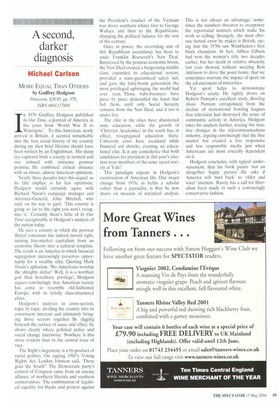A second, darker diagnosis
Michael Carlson
MORE EQUAL THAN OTHERS by Godfrey Hodgson Princeton, $29.95, pp. 379. ISBN 0691.117888
in1976 Godfrey Hodgson published In Our Time, a portrait of America in the years from 'World War II to Watergate'. To this American, newly arrived in Britain, it seemed remarkable that the best social history of my country during my then brief lifetime should have been written by an Englishman. His sharp eye captured both a society in turmoil and one imbued with immense postwar promise. He combined critical distance with an innate, almost American optimism.
Nearly three decades later this sequel, as its title implies, is far less optimistic. Hodgson would certainly agree with Richard Nixon's campaign manager and Attorney-General, John Mitchell, who said, on his way to gaol, 'This country is going so far to the right you won't recognise it.' Certainly there's little of In Our Time recognisable in Hodgson's analysis of the nation today.
He sees a country in which the postwar liberal consensus has indeed moved right, turning free-market capitalism from an economic theory into a cultural template. The result is an America in which financial segregation increasingly preserves opportunity for a wealthy elite. Quoting Mark Twain's aphorism, 'We Americans worship the almighty dollar! Well, it is a worthier god than hereditary privilege', Hodgson argues convincingly that American society has come to resemble old-fashioned Europe, with its strictly class-structured elites.
Hodgson's analyses in cross-section, topic by topic, dividing the country into its constituent interests and ultimately bringing those sectors together. By digging beneath the surface of cause and effect, he shows clearly where political policy and social change intertwine. Nowhere is this more evident than in the central issue of race.
The Right's hegemony is a by-product of racial politics. On signing 1965's Voting Rights Act, Lyndon Johnson said, 'There goes the South!' The Democratic party's control of Congress came from an uneasy alliance of northern liberals and southern conservatives. The combination of legalised equality for blacks and protest against the President's conduct of the Vietnam war drove southern whites first to George Wallace and then to the Republicans, changing the political balance for the rest of the century.
Once in power, the overriding aim of this Republican ascendancy has been to undo Franklin Roosevelt's New Deal. Buttressed by the postwar economic boom, the New Deal created a burgeoning middle class, expanded its educational system, provided a state-guaranteed safety net, and gave the baby-boom generation the most privileged upbringing the world had ever seen. Those baby-boomers have piece by piece dismantled the hand that fed them, until only Social Security remains from the New Deal, and it too is under fire.
The elite in the cities have abandoned state education, while the growth of 'Christian Academies' in the south has, in effect, resegregated education there. University costs have escalated while financial aid shrinks, creating an educational elite. Is it any coincidence that both candidates for president in this year's election were members of the same secret society at Yale?
This paradigm repeats in Hodgson's examination of American life. One major change from 1976, as befits a scholar rather than a journalist, is that he now draws on mounds of statistical analysis. This is not always an advantage: sometimes the numbers threaten to overpower the reportorial instincts which make his work so telling. Strangely, the most obvious factual error he makes is British, saying that the 1970s saw Wimbledon's first black champion. In fact, Althea Gibson had won the woman's title two decades earlier, but her death in relative obscurity last year showed, without needing Ron Atkinson to drive the point home, that we sometimes overrate the impact of sport on the advancement of minorities.
Yet sport helps to demonstrate Hodgson's acuity. He rightly draws on Robert Putnam's excellent study, Bowling Alone, Putnam extrapolated from the decline of recreational bowling leagues that television had destroyed the sense of community activity in America. Hodgson takes his analysis further, tracing the massive changes in the telecommunications industry, arguing convincingly that the free market has created a less responsive and less responsible media just when Americans are most crucially dependent on it.
Hodgson concludes, with typical understatement, that his book paints 'not an altogether happy picture'. He asks if America will 'turn back' to 'older and wiser' instincts. Rarely has a call for liberalism been made in such a convincingly conservative fashion.


































































































 Previous page
Previous page